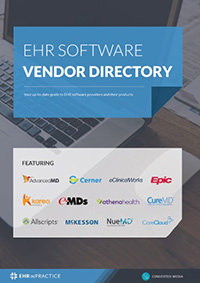How to sell cloud EHR to practice management
For practices who are switching from an on-premise EHR, or are new entrants as consumers in the EHR market, there will come a time when practice management will need to be persuaded as to the value of cloud-based EHR.
Given the perceived heightened risk of malicious attacks on healthcare data it would follow that executives might be cautious about cloud using a cloud based deployment. How can you persuade them to get on board with a cloud solution?
Address cloud EHR security misconceptions
Executives may be reticent, due to the perception that something that is secured on premises is inherently safer from attack. Conversely there may be security-related anxiety with cloud based deployment due to the perception that string data and deploying software from a cloud based server presents a greater security risk since data is transferred and stored in what appears to be in the ether (a third party remote server), making them more prone to attack. These fears are common.
For example, in a recent study of IT decision makers “nearly half (49%) admitted they are ‘very or extremely anxious’ about the security implications of cloud services.” Further, “more than three quarters of the respondents (76%) said that security is their main concern when it comes to cloud-based services” and “41% believed that all cloud-based services are ‘inherently insecure’.
Despite the prevalence of this view,which is based on the misperception that offsite data and software is inherently insecure in fact anecdotal data shows that security performance between the two systems is equal based on the fact that cloud EHRs must implement more robust security measures given the fact that data must travel to and from the cloud. When addressing this concern it is important to bring these facts to the attention of practice managers and how you can implement internal procedures which can further enhance security.
Emphasize the benefits of minimal service disruptions
Opponents of cloud EHRs often claim that on premise systems are more reliable since practices can ensure better maintenance and thereby performance because system checks can be performed on site and on a more regular basis. The common argument states that since cloud based systems rely on third party servers, downtime is more likely, simply based on the fact a third-party server and provider is involved.
Performance data on cloud vendors show quite the opposite. Cloud based storage and deployment boast high reliability since robust systems are in place to ensure quick recovery in case of a system outage. Most services offering cloud based services strive to achieve at least 99.95% availability or roughly 4.38 hours, whereas reliability data reveal that among all industries including health care the average reported unplanned downtime was 86 minutes. However, the latter figure should be taken with a slight caveat that that the on-premises down-time figure is likely more given that reliability data collected from on-premises servers often skews toward more reliability when in fact they are likely less reliable than reported more to the standards of a cloud service.
When considering strategies to overcome apprehension by senior management as to the reliability of cloud-based EHRs it is important to stress that cloud based deployments’ reliability is on par with on-premises systems and often have a more robust response to downtime resulting in better performance.
The comparative benefits between a cloud based deployment and an on premises deployment largely depend on context. Some practices may be better suited for a cloud-based deployment, whereas an on-premises deployment may suit others better. However, one thing that is certain is that the anxiety that cloud-based EHRs are unsafe or are unreliable often is misplaced based on performance data.
Free white paper

EHR Selection Survival Guide
The comprehensive guide to selecting the best EHR system for your medical practice.

Featured white papers
Related articles
-

Cloud EHR: a complete buyers' guide
Thinking about a cloud EHR for your practice? Read our comprehensive guide first.
-

iOS and Android mobile EHR apps: everything you need to know
Everything you need to know about mobile EHR - features, benefits, recommended apps and more
-

Five things US healthcare providers can learn from the NHS ransomware attack
US healthcare providers should be aware of tips to keep their systems safe from ransomware attacks




